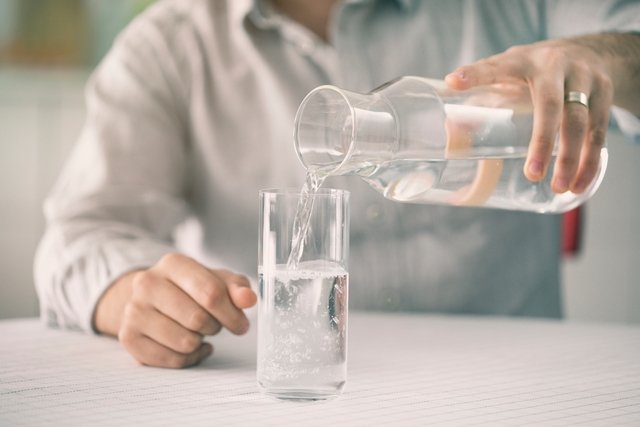Drinking too much water can be harmful to your health, as it can cause an imbalance of electrolytes in the body and result in “water intoxication”, with symptoms such as headache, nausea, vomiting, weakness or mental confusion.
Excess water in the body exceeds the kidneys’ ability to eliminate water, causing a decrease in sodium in the blood, called hyponatremia, which leads to swelling within the cells.
This water intoxication can happen when drinking more than 1 liter of water per hour, but it is also common in high-intensity athletes who end up drinking a lot of water during training, but without replacing the amount of minerals that are being lost.

Symptoms of overwatering
The main symptoms of water intoxication are:
- Headache;
- Nausea or vomiting;
- Dizziness;
- Cramps or muscle weakness;
- Blurred or blurred vision;
- Disorientation and mental confusion;
- Hallucinations.
In the most severe cases of hyponatremia, with sodium values below 120 mEq per liter of blood, difficulty breathing, convulsions, delirium, coma or even death may also occur.
If you suspect water poisoning, you should go to the hospital immediately, as excess water can cause swelling in the brain and put your life at risk.
How excess water harms your health
Excessive water consumption in a short period of time can exceed the kidneys’ capacity to eliminate this water, which is normally 0.8 to 1 liter of water per hour.
This excess water in the body can result in an imbalance of electrolytes in the blood, mainly sodium, which when it drops below 135 mEq per liter of blood, the person ends up developing hyponatremia.
The lower the amount of sodium per liter of blood, the greater the risk of affecting brain function and even causing permanent damage to brain tissue. This happens mainly due to swelling of the brain, which causes brain cells to be pressed against the bones of the skull.
Excess water can be even more problematic in people who have heart or kidney disease, as sodium imbalance can affect heart function and excess water can harm kidney function.
What to do in case of suspicion
If you suspect excessive water intake or “water intoxication” you should go to the hospital immediately.
The treatment of water intoxication is usually done with intravenous serum to replace the amounts of minerals in the body, especially sodium.
Eating a small salty snack can help alleviate some of the symptoms, such as headache or nausea, but it is always recommended to consult your general practitioner to assess the need for more specialized treatment.
Make an appointment with a general practitioner in the nearest region:
Taking care of your health has never been easier!
What is the ideal amount of water per day?
The recommended amount of water per day varies according to each person’s age, weight and even physical fitness level.
However, the ideal is to avoid consuming more than 1 liter of water per hour, as this appears to be the kidney’s maximum capacity to eliminate excess water. Take a closer look at the recommended daily amount of water by weight.
Bibliography
- CLAUDEL, SELF; et al. Severe hyponatremia due to surreptitious water intoxication in a hospitalized patient. CEN Case Rep. 12. 2; 135-138, 2023
- TAKENOUCHI, H.; et al. Case Report: A Patient With Neuroleptic Malignant Syndrome, Water Intoxication and Hyponatremia Associated With Severe Cerebral Edema and Coma. Front Endocrinol (Lausanne). 13. 822679, 2022
- FARRELL, D. J.; BOWER, L. Fatal water intoxication. J Clin Pathol. 56. 10; 803–804, 2003
- SIEGEL, AJ Fatal water intoxication and cardiac arrest in runners during marathons: prevention and treatment based on validated clinical paradigms. Am J Med. 128. 10; 1070-5, 2015
- TAUBE, M. Hyponatremia caused by water intoxication: successful treatment of psychiatric disturbances with olanzapine and fluoxetine. Oxf Med Case Reports. 2021. 1; omaa127, 2021
- PEECHAKARA, BV; GUPTA, M. IN: STATPEARLS (INTERNET). TREASURE ISLAND (FL): STATPEARLS PUBLISHING. Water Toxicity. 2022. Available at: <https://www.ncbi.nlm.nih.gov/books/NBK537231/>. Accessed on 17 Jul 2023
- GUYTON Arthur, HALL John. Textbook of medical physiology. 13th. Brazil: Elsevier, 2017. 314-315.
- LONGO, Dan L. et al. Harrison Internal Medicine. 18.ed. São Paulo: AMGH Editora, 2013. 344-345.

Sign up for our newsletter and stay up to date with exclusive news
that can transform your routine!
Warning: Undefined array key "title" in /home/storelat/public_html/wp-content/plugins/link-whisper-premium/templates/frontend/related-posts.php on line 12
Warning: Undefined array key "title_tag" in /home/storelat/public_html/wp-content/plugins/link-whisper-premium/templates/frontend/related-posts.php on line 13




